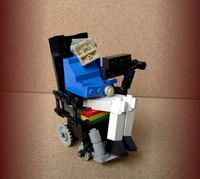- Posts: 661
- Thank you received: 50
Does epilepsy cause long-term memory loss?
- Able_Here_Team
-
 Topic Author
Topic Author
- Offline
- Moderator
-

Less
More
17 years 4 months ago #8144
by Able_Here_Team
Does epilepsy cause long-term memory loss? was created by Able_Here_Team
For a few hours after Jan Quinlan's first epileptic seizure, doctors thought her condition was due to misuse of drink or drugs. She remembers that clearly because she knew they were mistaken. Several days later she had surgery to remove a benign brain tumour. She remembers that time too, even though it was 14 years ago. What she doesn't remember is her sister's wedding in 2006 or 2007. She knows that she was there, because photographs prove it, but her only recollection of the day is that it was sunny.
“My memory is like pictures, but now some parts are blank,” she says. “It's like someone's turned off the TV. Nothing is left and nothing anyone says makes them come back. Random parts of my past have gone. There was no gradual deterioration; they just went after I had fits. I love my sister and it makes me feel emotional that I can't remember her wedding.”
Four years ago the first doctor to whom Quinlan reported that she had permanently lost chunks of her long-term memory told her that this was because of her age. Quinlan, now 55, was certain that her inability to remember some significant events from her past was connected to her epilepsy and sought a second opinion. This time the doctor supported her.
It is well-known that people with epilepsy commonly report difficulties with memory. What is not always accepted by doctors is that epilepsy could be the cause of the memory problems. “The prevalence of the memory impairment that goes along with epilepsy is under-recognised and under-appreciated,” says John Duncan, professor of neurology at University College, London, and medical director of the National Society for Epilepsy. “People often make light of it. I don't think there's any conspiracy; it's just what people have been taught. There can be many factors and it can be difficult to tease out the contribution of the different parts.”
Duncan believes that long-term memory loss can be caused by epilepsy, particularly if the seizures involve the temporal lobe (the part of the brain where memories are laid down). He describes a seizure as an abnormal firing of nerve cells. “It's like an excessive electrical discharge that burns out some of the wiring. Each seizure may knock out one nerve cell in 1,000, which wouldn't be obvious, but if someone over the course of years has hundreds of seizures, there would be a cumulative effect.”
Gus Baker, professor of clinical neuropsychology at the University of Liverpool, works exclusively in the field of epilepsy. “In the 20 years I've been in clinical practice, I've yet to come across a patient who hasn't experienced memory difficulties,” he says. “There are a number of studies that show that epilepsy and epileptic foci, the part of the brain that causes people to have seizures, disrupts the long-term consolidation of memory.” Baker says memory is important because it is one of the foundation blocks of our relationships. “Some patients avoid contact with other people because they're embarrassed about memory loss. Having a good memory is important for social skills - and also for learning. It's frustrating to see adolescents with epilepsy, where there is little recognition that they are likely to have memory problems and need extra support in the acquisition of knowledge, particularly when they come to GSCEs.”
Another reason for the underrecognition of the link between epilepsy and memory is that conventional memory tests don't pick up autobiographical memory problems, says Adam Zeman, Professor of Cognitive and Behavioural Neurology at the Penisula Medical School in Exeter. “Often when one sends people with epilepsy to have standard psychological tests, the report comes back normal. That's because typically the tests ask you to learn a list of words and remember them half an hour later; they don't tap your autobiographical memory.”
Zeman, like Duncan and Baker, does not attribute long-term memory problems to the drugs used to treat epilepsy - modern drugs are less toxic in this respect than the sedating barbiturates used in the past - although large combinations of combined drugs can impair a person's concentration and speed of thought. In Zeman's study of 50 people with adult-onset epilepsy, all suffered from transient epileptic amnesia, a short period of amnesia when they had seizures, and about three quarters had patchy but permanent long-term memory loss for past events that they often knew they could remember previously. “One reason for wondering whether the seizures are the cause is that with this condition you can make the seizures go away, but people are still left with the memory loss of their personal past.”
Treatment for memory loss is a difficult area. It is clearly helpful to use drugs to try to reduce seizures and, if a regime slows down a patient, it can be changed. Depression and anxiety can also be treated, and increasingly doctors recommend that patients with memory problems develop strategies to help them: Baker's team at the Walton Centre for Neurology and Neurosurgery in Liverpool has developed a memory programme that advises on techniques for remembering.
Even though epilepsy affects one British person in 131, its treatment has always been underfunded. Doctors and patients recognise that the condition carries a stigma, largely because seizures are frightening. This is why Quinlan is speaking out. A tall, elegant woman who was a career counsellor and “didn't do ill” until she had her first seizure, she is now unable to work but lives independently in Middlesex. She says her current doctor has given her psychological succour by believing in her memory loss, though it has damaged some of her friendships. When I ask how she fills her time she mentions some weekends away but can't provide many details, which she says illustrates her point. “I spend a lot of time alone. I don't know whether it's choice or circumstance. I'm resourceful and I've got used to it.”
.
From www.timesonline.co.uk/tol/life_and_style...h/article4635471.ece
“My memory is like pictures, but now some parts are blank,” she says. “It's like someone's turned off the TV. Nothing is left and nothing anyone says makes them come back. Random parts of my past have gone. There was no gradual deterioration; they just went after I had fits. I love my sister and it makes me feel emotional that I can't remember her wedding.”
Four years ago the first doctor to whom Quinlan reported that she had permanently lost chunks of her long-term memory told her that this was because of her age. Quinlan, now 55, was certain that her inability to remember some significant events from her past was connected to her epilepsy and sought a second opinion. This time the doctor supported her.
It is well-known that people with epilepsy commonly report difficulties with memory. What is not always accepted by doctors is that epilepsy could be the cause of the memory problems. “The prevalence of the memory impairment that goes along with epilepsy is under-recognised and under-appreciated,” says John Duncan, professor of neurology at University College, London, and medical director of the National Society for Epilepsy. “People often make light of it. I don't think there's any conspiracy; it's just what people have been taught. There can be many factors and it can be difficult to tease out the contribution of the different parts.”
Duncan believes that long-term memory loss can be caused by epilepsy, particularly if the seizures involve the temporal lobe (the part of the brain where memories are laid down). He describes a seizure as an abnormal firing of nerve cells. “It's like an excessive electrical discharge that burns out some of the wiring. Each seizure may knock out one nerve cell in 1,000, which wouldn't be obvious, but if someone over the course of years has hundreds of seizures, there would be a cumulative effect.”
Gus Baker, professor of clinical neuropsychology at the University of Liverpool, works exclusively in the field of epilepsy. “In the 20 years I've been in clinical practice, I've yet to come across a patient who hasn't experienced memory difficulties,” he says. “There are a number of studies that show that epilepsy and epileptic foci, the part of the brain that causes people to have seizures, disrupts the long-term consolidation of memory.” Baker says memory is important because it is one of the foundation blocks of our relationships. “Some patients avoid contact with other people because they're embarrassed about memory loss. Having a good memory is important for social skills - and also for learning. It's frustrating to see adolescents with epilepsy, where there is little recognition that they are likely to have memory problems and need extra support in the acquisition of knowledge, particularly when they come to GSCEs.”
Another reason for the underrecognition of the link between epilepsy and memory is that conventional memory tests don't pick up autobiographical memory problems, says Adam Zeman, Professor of Cognitive and Behavioural Neurology at the Penisula Medical School in Exeter. “Often when one sends people with epilepsy to have standard psychological tests, the report comes back normal. That's because typically the tests ask you to learn a list of words and remember them half an hour later; they don't tap your autobiographical memory.”
Zeman, like Duncan and Baker, does not attribute long-term memory problems to the drugs used to treat epilepsy - modern drugs are less toxic in this respect than the sedating barbiturates used in the past - although large combinations of combined drugs can impair a person's concentration and speed of thought. In Zeman's study of 50 people with adult-onset epilepsy, all suffered from transient epileptic amnesia, a short period of amnesia when they had seizures, and about three quarters had patchy but permanent long-term memory loss for past events that they often knew they could remember previously. “One reason for wondering whether the seizures are the cause is that with this condition you can make the seizures go away, but people are still left with the memory loss of their personal past.”
Treatment for memory loss is a difficult area. It is clearly helpful to use drugs to try to reduce seizures and, if a regime slows down a patient, it can be changed. Depression and anxiety can also be treated, and increasingly doctors recommend that patients with memory problems develop strategies to help them: Baker's team at the Walton Centre for Neurology and Neurosurgery in Liverpool has developed a memory programme that advises on techniques for remembering.
Even though epilepsy affects one British person in 131, its treatment has always been underfunded. Doctors and patients recognise that the condition carries a stigma, largely because seizures are frightening. This is why Quinlan is speaking out. A tall, elegant woman who was a career counsellor and “didn't do ill” until she had her first seizure, she is now unable to work but lives independently in Middlesex. She says her current doctor has given her psychological succour by believing in her memory loss, though it has damaged some of her friendships. When I ask how she fills her time she mentions some weekends away but can't provide many details, which she says illustrates her point. “I spend a lot of time alone. I don't know whether it's choice or circumstance. I'm resourceful and I've got used to it.”
.
From www.timesonline.co.uk/tol/life_and_style...h/article4635471.ece
Please Log in or Create an account to join the conversation.
17 years 4 months ago #8188
by suzan
Replied by suzan on topic Re:Does epilepsy cause long-term memory loss?
yes...this is very interesting to me 
i have neurosarcoidosis, currently inactive,but with much brain scarring, which is the cause of my disabilities at present.
i got epilepsy as first sign of inflammation in my brain...had 2grand-mal fits...took ages to control it...stayed on epilepsy drugs for a few years.....also prescribed a host of other drugs in cluding high dose steroids et al to control inflammation......
i have a similiar problem to jan of the above article....my memory is rubbish, and i have big gaps in midterm memories....i not so lucky as she, in that doctors dont want to know, i had the memory test the article mentions, and yes, like it says, i didnt show anything abnormal!!.....so now they dont seem interested.....after all, what can they do,if they seeanything anyway???...i do lots of brain activities to try to keep my memory alive, but it aint easy..........i forget huge chunks of my life of a few years ago...friends here probably witnessed this?!!....it makes managing my life quite hard.....i even forget ppl that i know faairly well from sometime ago, and dont recognise who they are until they speak!!!...why is this i wonder???
i have scarring right across my brain including in the frontal lobe......im not sure that my memory loss iss attributable to the epilepsy i experienced or not, or to the neurosarcoidosis, which is themain cause of the scarring.
what i do know is that like jan this is real, and i wish i could find a doctor who would take me seriously, she has been lucky to have done so.
suzan xx
more on sarcoidosis here.. www.ablehere.com/component/option,com_jo...nc,showcat/catid,60/
Post edited by: suzan, at: 2008/09/04 18:38
i have neurosarcoidosis, currently inactive,but with much brain scarring, which is the cause of my disabilities at present.
i got epilepsy as first sign of inflammation in my brain...had 2grand-mal fits...took ages to control it...stayed on epilepsy drugs for a few years.....also prescribed a host of other drugs in cluding high dose steroids et al to control inflammation......
i have a similiar problem to jan of the above article....my memory is rubbish, and i have big gaps in midterm memories....i not so lucky as she, in that doctors dont want to know, i had the memory test the article mentions, and yes, like it says, i didnt show anything abnormal!!.....so now they dont seem interested.....after all, what can they do,if they seeanything anyway???...i do lots of brain activities to try to keep my memory alive, but it aint easy..........i forget huge chunks of my life of a few years ago...friends here probably witnessed this?!!....it makes managing my life quite hard.....i even forget ppl that i know faairly well from sometime ago, and dont recognise who they are until they speak!!!...why is this i wonder???
i have scarring right across my brain including in the frontal lobe......im not sure that my memory loss iss attributable to the epilepsy i experienced or not, or to the neurosarcoidosis, which is themain cause of the scarring.
what i do know is that like jan this is real, and i wish i could find a doctor who would take me seriously, she has been lucky to have done so.
suzan xx
more on sarcoidosis here.. www.ablehere.com/component/option,com_jo...nc,showcat/catid,60/
Post edited by: suzan, at: 2008/09/04 18:38
Please Log in or Create an account to join the conversation.
-

- New Member
-

Less
More
- Thank you received: 0
17 years 2 months ago #13349
by
Replied by on topic Re:Does epilepsy cause long-term memory loss?
I had shot term memory loss for about 2 years .
After i had a surgery called frountal left removal
to remove my EPILEPSY. I COULD REMBER THINGS MY WIFE
MY KIDS BUT IT WAS STILL HARD JUST TO GET STARTED AGIN
IT WAS LIKE A SWITCH TURNED OFF . I STILL HAVE PROBLEMS REMBERING LONG TERM THINGS . MAYBE THATS BECASE
IM OLDER .ONE THING IF GOD SAYS YOU HAVE TO GO TO
PERATORY YOU CAN SAY NO THANKS IV'E HAD MINE.
EPILEPISY IS NOT TO BE MESSED WITH AFTER EACH SEIZURE
I DO HAVE MEMORY LOSS .NOW IT TAKES ABOUT 2 DAYS OF REST TO RECHARGE BACK TO WHERE I WAS .
ANSWER :TO YOU QUESTION ONLY SHORT TERM MEMORY LOSS IS EFFECTED. NOT THE LONG TERM
FOR ME
BEAR
After i had a surgery called frountal left removal
to remove my EPILEPSY. I COULD REMBER THINGS MY WIFE
MY KIDS BUT IT WAS STILL HARD JUST TO GET STARTED AGIN
IT WAS LIKE A SWITCH TURNED OFF . I STILL HAVE PROBLEMS REMBERING LONG TERM THINGS . MAYBE THATS BECASE
IM OLDER .ONE THING IF GOD SAYS YOU HAVE TO GO TO
PERATORY YOU CAN SAY NO THANKS IV'E HAD MINE.
EPILEPISY IS NOT TO BE MESSED WITH AFTER EACH SEIZURE
I DO HAVE MEMORY LOSS .NOW IT TAKES ABOUT 2 DAYS OF REST TO RECHARGE BACK TO WHERE I WAS .
ANSWER :TO YOU QUESTION ONLY SHORT TERM MEMORY LOSS IS EFFECTED. NOT THE LONG TERM
FOR ME
BEAR
Please Log in or Create an account to join the conversation.
10 years 5 months ago #58582
by Saunter
Replied by Saunter on topic Does epilepsy cause long-term memory loss?
Yes
Please Log in or Create an account to join the conversation.
10 years 4 months ago #58972
by Sandie
Replied by Sandie on topic Does epilepsy cause long-term memory loss?
Yes without doubt
Please Log in or Create an account to join the conversation.
10 years 4 months ago #59264
by Saunter
Replied by Saunter on topic Does epilepsy cause long-term memory loss?
I have right temporal lobe complex partial epilepsy with a single sclerosis.the single sclerosis causes the epilepsy , and complex syndrome migraines, both are under prescription treatment which works pretty well. Yippee epilepsy folk to talk to I've been so alone feel a little less so. My daughter has mixed complex epilepsy. And her RX also does a pretty good job.
Please Log in or Create an account to join the conversation.
Moderators: malh007
Time to create page: 0.240 seconds



